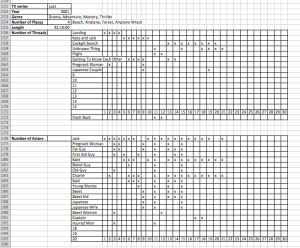For the project preparation, main focus has been set on to our research questions. During the project, they should be our main objective and an overall aim.
In the first two weeks of the project, meetings have been set up to discuss and define the practical procedure of the data gathering in detail. These definitions are very crucial, so that data will be comparable independently of the person who analyzes a certain series. In order to achieve this, each step of the data gathering has been determined.
A prepared excel sheet has been set up, which all three team members will use in their individual work. The form (see fig. 1) consists of two tables with a vertical axis with either the different threads or all the roles appearing in the series. The horizontal axis stands for the time and is separated into frames of two minutes. This means that every second minute the current threads are analyzed and brought down to paper. As an additional complexity factor, flashbacks are recorded too. At the same time, all appearing major roles are listed. Furthermore, each member records all places that show up during the episode.
Different series were chosen. We put emphasis on diversity in terms of the genre of the series as well on the time, when they were released. With the choice of 21 series, the different genres can be covered properly. Another thought we came up with was: If we will notice a tendency in the narrative complexity over the last 20 years (our first research question), it would not make sense to compare different genres at different times. To fix one variable, we would then analyze and compare additional series from the same time. For that reason we focused on the time dependence in the first part of the semester project.
The series were assigned to the member of the team that knows the series the best. This makes the data gathering more efficient, more accurate and more reproducible. By knowing already the story, it is much simpler to gather the specifically desired data, e.g. one knows which characters play a major role and which can be neglected.
We assume that the narrative style as well as the level of complexity does not change with the evolution of a series. The first episode is therefore meant to be representative for the entire series. Therefore it is even a prerequisite to have a certain level of knowledge about a series in order to interpret it well.
Independently of each other, we ran a test phase in the second week. As far as we could validate up to then, we were content and agreed on continuing the elaborated data gathering process.
Right according to the time plan, we started with the individual data gathering and kept in contact with each other to periodically discuss the ongoing progress of the project.
In a next step, we will converge all gathered data and start with the evaluation. According to the project calendar, we reckoned only two weeks for the processing and evaluation of the data. This seems very optimistic from the actual point of view. We will therefore take into account another week for this and start as soon as possible with the evaluation to be able to stick to the time plan.
